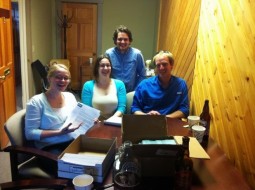Hello Great Lakes lovers.

Here I am (at top center) helping out on the Great Lakes Society campaign along with Mattias Johnson (bottom right) Allison Voglesong (center) and Eliza Somsel (left)
My name is Justin Sterk and I have recently begun volunteering at FLOW, in downtown Traverse City, Michigan. As a native of Traverse City, the Great Lakes hold special importance to me and my family, and it is a great thrill for me to be able to begin contributing to the protection of our region’s greatest resource.
As for me, I graduated from Traverse City Central High School in 2007, the University of Michigan in 2012 and am currently serving a year-long AmeriCorps term in Traverse City before starting law school at Wayne State University in August. I am very interested in legal strategies that can be used to conserve and protect our planet’s natural resources. My plan is to make a career out of the type of work FLOW does, which is another great benefit of being around the office, learning from FLOW’s incredible staff.
I’ve been here for about a month and a half and have been working on a couple different projects. One has been the early stages of a program that complements the work of Council of Canadians, a partner of FLOW, and their Blue Communities Program. A Council of Canadians Blue Community is one that adopts resolutions that
- Recognize water as a human right,
- Ban bottled water in public places and at municipal events, and
- Promote publicly financed, owned and operated water and wastewater services.
A blue community is one that makes a commitment to sustainable water use and resists the ever increasing trend of water privatization. It is our hope that a Blue Communities type of program can be implemented as part of a package of pragmatic water conservation best practices to assist communities in conserving water in many different areas.
The other research I have just recently begun working on relates to the connection between food production and water health. FLOW’s goal is to provide information about water’s inextricable linkage to food production, especially as it relates to phosphorous runoff—a major cause of harmful algal blooms—which affected Lake Erie on a massive scale in 2011. Further, we hope to promote awareness of how climate change increases the impacts on this food and water linkage.
I will try to update everyone on the work I am doing throughout the summer and to provide insight into the kind of work a FLOW volunteer can do. Have a great day and enjoy our beautiful Great Lakes region.

